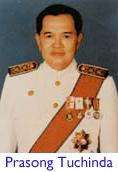Professor Dr. Prasong Tuchinda graduated M.D. from University of Medical Sciences, Bangkok, Thailand in 1945. He had further training in Pediatrics and Tropical Medicine at the University of London, United Kingdom where he obtained D.T.M. & H. (Eng) in 1952 and Certificate of Senior Teacher of Child Health UNICEF & WHO Sponsored Course in 1962. He was qualified Thai Board of Pediatrics from the Medical Council of Thailand in 1971, and received Honorary Degree of Doctor of Science in Medicine from Mahidol University in 1985.
Professor Dr. Prasong Tuchinda served as the Chairman of the Department of Pediatrics, Faculty of Medicine Siriraj Hospital, Mahidol University, Bangkok, Thailand for 15 years (1969-1984). Professor Tuchinda has been a pioneer researcher in studying the etiology, pathophysiology, pathology and clinical manifestations including various laboratory findings in dengue hemorrhagic fever since 1968. The knowledge gained from his researches has been applied to proper and effective management of dengue hemorrhagic fever resulted in reduction of the mortality rate from nearly 20 percent in the past to only less than 2 percent at the present time.
Professor Dr. Prasong played the important role of profound leadership in conducting valuable researches to understand the etiology, pathophysiology and immunopathogenesis of dengue hemorrhagic fever which is still the major public health problems in Thailand as well as in Southeast Asian countries. His researches has contributed to the discovery of the pathogenesis of the disease as followed: the severe dengue hemorrhagic fever is the result of secondary dengue infection leading to abnormal immune response and releasing of various mediators causing increased capillary permeability, plasma leakage, reduction of plasma volume and hypovolumic shock. The immune complexes also cause destruction of platelet, impaired platelet function and activation of coagulation system leading to severe hemorrhage. Professor Tuchinda has applied these advanced knowledge to proper treatment of hypovolumic shock by replacement therapy with crystaloid or colloid solutions as well as using the platelet concentrate and blood transfusion for severe hemorrhage. These proper and effective managements resulted in the reduction of the mortality rate from nearly 20 percent in the early epidemic to only 2 percent at the present time. Moreover, his research works have formed the basis for further investigations and development of dengue vaccine for the pervention and control of dengue hemorrhagic fever in Thailand as well as in Southeast Asian countries in the future.
 |
Professor Dr. Prasong Tuchinda M.D.,D.T.M.&H. (Eng)Thailand
|

